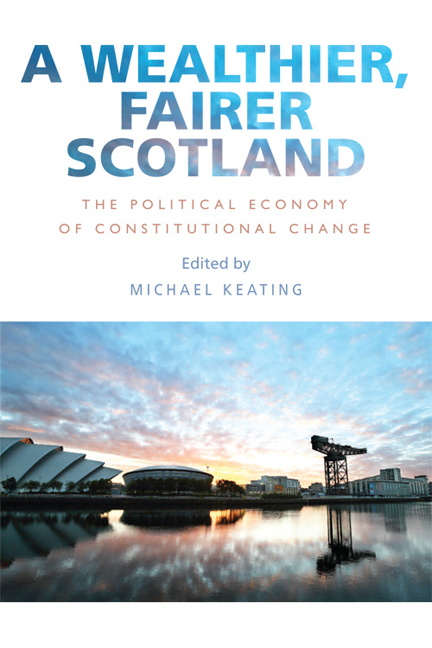Book contents
- Frontmatter
- Contents
- List of Figures
- List of Tables
- List of Contributors
- Preface
- 1 The Political Economy of Devolution
- 2 Taxes and Spending
- 3 Inequality in Scotland: Dimensions and Policy Responses
- 4 Towards a Fairer Scotland? Assessing the Prospects and Implications of Social Security Devolution
- 5 A More Gender-Equal Scotland? Childcare Policy in Scotland after the Independence Referendum
- 6 Constitutional Change, Social Investment and Prevention Policy in Scotland
- 7 Getting to a Wealthier and Fairer Scotland
- References
- Index
6 - Constitutional Change, Social Investment and Prevention Policy in Scotland
Published online by Cambridge University Press: 22 December 2017
- Frontmatter
- Contents
- List of Figures
- List of Tables
- List of Contributors
- Preface
- 1 The Political Economy of Devolution
- 2 Taxes and Spending
- 3 Inequality in Scotland: Dimensions and Policy Responses
- 4 Towards a Fairer Scotland? Assessing the Prospects and Implications of Social Security Devolution
- 5 A More Gender-Equal Scotland? Childcare Policy in Scotland after the Independence Referendum
- 6 Constitutional Change, Social Investment and Prevention Policy in Scotland
- 7 Getting to a Wealthier and Fairer Scotland
- References
- Index
Summary
Introduction
Constitutional change provides an opportunity to debate radical policy change. In Scotland, the prospect of independence or the devolution of significantly new powers allowed its advocates and political commentators the chance to reconsider the Scottish Government's policy choices and the way in which it makes and delivers policy. Issues of social policy, social justice and how to organise public spending during a long period of ‘austerity’ became central to political debate in the years leading up to the referendum (Mooney and Scott 2015).
While the idea of social investment had been popular for some time, it grew in importance during the constitutional debate. It fits well with the vague idea – promoted by many organisations, including the SNP – that Scottish independence is a social democratic project, offering an alternative to austerity politics and neo-liberalism. It also complements an existing Scottish Government agenda to reduce inequalities and address its decreasing budget by reducing acute public service demand through early intervention and prevention policies.
Social investment and prevention are closely related concepts with major implications for policy and policy making in Scotland. Both highlight the value of investment in human capital (Chapter 1), and are linked closely to the Scottish Government's preferred method of governance – the Scottish Approach to Policymaking – associated with terms such as social partnership, co-production and assets based approaches (Cairney, Russell and St Denny 2016).
However, we draw on two public policy concepts to show that, although the referendum provided this opportunity for public debate, we should not exaggerate its impact on government policy. The first concept is ambiguity: broad policy aims lack meaning unless they are operationalised in detail. This process was often absent during the referendum debate. Instead, groups with little chance of policy influence made broad and often heroic claims of radical policy change to come, while the Scottish Government was more modest or vague in its intentions. It is easier to identify buzz words or slogans for policy reform and broad long-term aspirations than specific aims and objectives, and therefore it is difficult to tell if those objectives would compete with the day-to-day business of government. Social investment is rarely properly defined, and prevention often describes a philosophy of government or broad aspiration rather than a specific policy agenda delivered in practice.
- Type
- Chapter
- Information
- A Wealthier, Fairer ScotlandThe Political Economy of Constitutional Change, pp. 110 - 128Publisher: Edinburgh University PressPrint publication year: 2017



